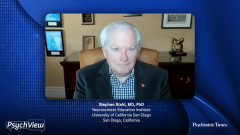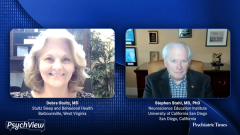
Symptoms of Narcolepsy: Sleep Paralysis & Hallucinations
In this custom video series, experts within the fields of sleep and neuroscience discuss additional symptoms that can occur in patients with narcolepsy and REM cycle abnormalities.
Episodes in this series

Debra Stultz, MD: There are other symptoms of narcolepsy, and that’s sleep paralysis and hypnagogic hallucinations. The problem with narcolepsy is REM [rapid eye movement] sleep. During REM sleep, your brain is very active. Your body is supposed to be paralyzed. All these symptoms occur with REM abnormalities. With sleep paralysis, the brain wakes up and the body is still paralyzed. Now, sleep paralysis can occur with anybody who has severe sleep deprivation. Doctors and residents have had it, shift workers have had it. There’s even a familial form of sleep paralysis, but narcolepsy patients get this 1 commonly, and it’s very frightening.
Stephen Stahl, MD, PhD: Yeah, it scares the heck out of people.
Debra Stultz, MD: Right. When they say they have panic attacks at nighttime, I’ll start thinking could it be sleep paralysis because they wake up, and their heart is racing. They can’t move. One of my patients had a particularly good description of this. He called it sleep drowning. He said, “Have you ever been right under the water, and you’re trying to get up but you can’t?” That’s exactly what it’s like. I thought that was a great description.
Stephen Stahl, MD, PhD: Yes.
Debra Stultz, MD: Hypnagogic hallucinations are abnormal sensations: hearing voices, seeing things, sensing a presence when you’re going to or coming from sleep. It’s usually going to sleep. These symptoms, although not necessary for the diagnosis of narcolepsy present, can be quite disturbing. Patients are very frustrated when they have these symptoms, and they don’t necessarily link it with the sleepiness or even the cataplexy. Sometimes they’re very surprised when I ask them about it. They’ll go, “How did you know that?”
Stephen Stahl, MD, PhD: Maybe it’s something that’s frightening, and they don’t want to go to sleep then.
Debra Stultz, MD: Right, it can contribute. It’s a vicious cycle. That brings up the next point: insomnia, or disrupted nocturnal sleep. There have been reports of a doctor saying you can’t have narcolepsy if you have insomnia. I had a patient tell me that once, but that’s just not true. The same way the light flickers during the day with REM phenomenon, wake flickers into sleep. People who have narcolepsy have decreased sleep efficiency. They may go to sleep quickly, but they don’t stay asleep. They have more stage I sleep. They have more transitions in sleep. They have early onset REM periods. Obviously, we need that for the diagnosis. Even though they’re asleep, they’re not sleeping right, and they’re not sleeping deep. Their sleep is very fragmented.
Stephen Stahl, MD, PhD: They’ve got to have a rhythm. You’ve got to be awake, and then you have to be asleep. Then during sleep you have rhythms within sleep. Once you start losing that, I would say all hell breaks loose.
Debra Stultz, MD: Right. The thing about narcolepsy is that this is usually developed over a number of years, with the sleep problem starting first. Maybe the cataplexy doesn’t present for several years. Some people are used to it. They’re used to not sleeping well, and they focus on just the hypersomnia. You’ve got to tease out these symptoms.
Transcript edited for clarity.
Disclosures:
Dr Stephen Stahl is clinical professor of psychiatry and neuroscience at the University of California Riverside, adjunct professor of psychiatry at the University of California San Diego, and honorary fellow in psychiatry at the University of Cambridge. Over the past 12 months (January 2020 - December 2020), Dr Stahl has served as a consultant to Acadia, Alkermes, Allergan, AbbVie, Arbor Pharmaceuticals, Axovant, Axsome, Celgene, Concert, Clearview, EMD Serono, Eisai Pharmaceuticals, Ferring , Impel NeuroPharma, Intra-Cellular Therapies, Ironshore Pharmaceuticals, Janssen, Karuna, Lilly, Lundbeck, Merck, Otsuka, Pfizer, Relmada, Sage Therapeutics, Servier, Shire, Sunovion, Takeda, Taliaz, Teva, Tonix, Tris Pharma, and Viforpharma; he is a board member of Genomind; he has served on speakers bureaus for Acadia, Lundbeck, Otsuka, Perrigo, Servier, Sunovion, Takeda, Teva, and Vertex; and he has received research and/or grant support from Acadia, Avanir, Braeburn Pharmaceuticals, Eli Lilly, Intra-Cellular Therapies, Ironshore, ISSWSH, Neurocrine, Otsuka, Shire, Sunovion, and TMS NeuroHealth Centers.
Dr Debra Stultz is the Director and Owner of Stultz Sleep and Behavioral Health in Barboursville, West Virginia. Dr Stultz earned her medical degree from Marshall University School of Medicine in Huntington, West Virginia. She completed a residency in psychiatry and a fellowship in child and adolescent psychiatry through West Virginia University at their Charleston Division through Charleston Area Medical Center in Charleston, West Virginia. She is board certified in psychiatry, sleep medicine, and behavioral sleep medicine. With a special interest in Narcolepsy, she treats a variety of sleep disorders and psychiatric issues. She is also the editor for the Clinical TMS Society newsletter, on their Board of Directors, and the chairman of the TMS and Sleep Disorders Affinity Group. Dr Stultz is on the advisory committee for Harmony Biosciences and is a speaker for Harmony Biosciences and Jazz Pharmaceuticals.
Newsletter
Receive trusted psychiatric news, expert analysis, and clinical insights — subscribe today to support your practice and your patients.










